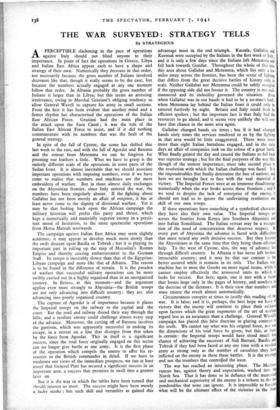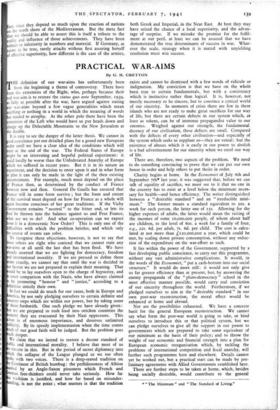THE WAR SURVEYED : STRATEGY TELLS
By STRATEGICUS
APERCEPTIBLE slackening in the pace of operations against Italy should not blind anyone to their importance. In point of fact the operations in Greece, Libya and Italian East Africa appear each to have a shape and strategy of their own. Numerically they decrease in that order, not necessarily because the gross number of Italians involved decreases like that, though it really seems to be the case; but because the numbers actually engaged at any one moment follow that order. In Albania probably the gross number of Italians is larger than in Libya; but this seems an arresting irrelevance, owing to Marshal Graziani's obliging tendency to allow General Wavell to capture his army in small sections. From the first it has been evident that another mind and a firmer rhythm has characterised the operations of the Italian East African Force. Graziani had the main place in the attack upon the Suez Canal ; it was the role of the Italian East African Force to assist, and if it did nothing commensurate with its numbers that was the fault of the general strategy.
In spite of the fall of Cyrene, the scene has shifted this last week to the east, and with the fall of Agordat and Barentu and the retreat from Metemma we can be forgiven for preening our feathers a little. What we have to grasp is the entirely different scale of the operations in some parts of the Sudan front. It is almost inevitable that we should associate important operations with imposing numbers, even if we have come to realise that numbers and machines are the mere embroidery of warfare. But in these almost daily exchanges on the Abyssinian frontier, since Italy entered the war, the numbers have been singularly absent. If the fighting about Gallabat has not been merely an affair of outposts, it has at least never come to the dignity of divisional warfare. Yet it may be that looking back upon the African campaign the military historian will prefer this parry and thrust, which kept a numerically and materially superior enemy in a persis- tent mood of hesitation, to the more spectacular operations from Mersa Matruh westwards.
The campaign against Italian East Africa may seem slightly academic; it may appear to develop much more slowly than the swift descent upon Bardia or Tobruk ; but it is playing its important part in rolling up the map of Mussolini's Roman Empire and thereby causing embarrassment to the German Staff. Its tempo is inevitably slower than that of the Egyptian- Libyan campaign and more like that of Albania. The reason is to be found in the difference of terrain. It is the paradox of warfare that successful military operations can be more swiftly carried out in a highly organised than in an unorganised country. In Eritrea, at this moment—and the argument applies even more strongly to Abyssinia—the British troops are not only advancing into difficult country: they are also advancing into poorly organised country.
The capture of Agordat is of importance because it places the Imperial troops on the railway to the capital and the coast. But the road and railway thread their way through the hills; and a resolute enemy could challenge almost every step of the advance. Moreover, the cutting off of Barentu involves the garrison, which was apparently successful in making its escape, in a retreat on a line that diverges from that taken by the force from Agordat. This in itself is a significant success, since the total force originally engaged on this sector can no longer give battle as one army. It is the first phase of the operation which compels the enemy to offer his re- sources to the British commander in detail. If we have to moderate our views of the immediate prospects, we can at least assert that General Platt has secured a significant success in an important area, a success that promises to swell into a greater later on.
But it is the way in which the tables have been turned that should interest us most. The success might have been merely a lucky stroke ; but such skill and versatility as gained this advantage must in the end triumph. Kassala, Gallabat and Kurmuk were occupied by the Italians in the first week of July; and it is only a few days since the Italians left Metemma and fell back towards Gondar. Throughout the whole of this time this area about Gallabat and Metemma, which lies only a few miles away across the frontier, has been the scene of fighting that differs from the great decisive battles of history only in scale. Neither Gallabat nor Metemma could be safely occupied if the opposing side did not favour it. The country is not well- mannered and its indocility governed the situation. Even when Gallabat was in our hands it had to be a no-man's-land; when Metemma lay behind the Italian front it could only be entered furtively by night. Britain and Italy could both be efficient spoilers ; but the important fact is that Italy had the resources to go ahead, and it seems very unlikely she will ever have that chance in the same area again.
Gallabat changed hands six times ; but if it had changed hands sixty times the services rendered to us by the fighting in that area would be little exaggerated. There were never more than eight Italian battalions engaged, and in the early days an affair of companies took on the colour of a great battle. What finally gained the day and caused the Italians to fall back was superior strategy ; but for the final purposes of the war this, though of the utmost importance, must take second place to the resolution with which the Italian challenge was faced. It is the imponderables that finally determine the fate of nations, and here we are brought face to face with the real material of victory. The Imperial Forces were at an immense disadvantage numerically when the war broke across these frontiers ; and if we tend to despise the lack of enterprise of the enemy, it should not lead us to ignore the undeviating resolution and skill of our own troops.
If these operations have something of a symbolical character. they have also their own value. The Imperial troops are across the frontier from Kenya into Southern Abyssinia and into Italian Somaliland. The Italian retreat may be a recogni- tion of the need of concentration that deserves respect. In every part of Abyssinia the advance is faced with difficulties that must retard any swift decisive success. But they hearten the Abyssinians at the same time that they bring them effectual help. To the west of Cyrene, also, the way of advance lies through difficult country. In Albania it has never left broken. intractable country; and it may be that our content is the better assured while it remains in its toils. The Italian war- machine has to meet the Greeks on more equal terms, while it cannot employ effectively the armoured units to which it looks for success. But here, again, one is met with a factor that looms large only in the pages of history, and nowhere in the doctrine of the dictators. It is their view that numbers and mass ensure the result almost automatically.
Circumstances conspire at times to justify this reading of the war. It is false; and it is, perhaps, the best hope we have of victory that the enemy will continue to place their reliance upon factors which the great exponents of the art of warfare regard less as an assurance than a challenge. General Wavells campaign has placed this false doctrine in glaring contrast 10 the truth. We cannot say what was his original force, nor can the dimensions of his total force be given; but this, at least, is certain: the Imperial troops would have stood much less chance of achieving the successes of Sidi Barrani, Bardia and Tobruk if they had been faced at any one time with a resolute army as strong only as the number of casualties they have inflicted on the enemy in these three battles. It is the strategl and not the numbers that controlled the issue.
The war has reached an interesting phase. The Mediter- ranean has, against theory and expectation, washed into the North Sea. That it has done so in defiance of the numerical and mechanical superiority of the enemy is a tribute to the la ponderables that none can ignore. It is impossible to forecas' what will be the ultimate effect of the victories in the Neal t, since they depend so much upon the reaction of nations n the north shore of the Mediterranean. But the mere fact t we should be able to assert this is itself a tribute to the ity and influence of those achievements. They have been ubject to inferiority in numbers and material. If Germany, as eems to be true, rarely attacks without first assuring herself f effective superiority, how different is the case of the armies, both Greek and Imperial, in the Near East. At best they may have seized the chance of a local superiority, and the advan- tage of surprise. If we mistake the promise for the fulfil- ment at our • peril, at least we can be assured that we have demonstrated the true determinants of success in war. What- ever the scale, strategy when it is mated with unyielding resolution must win success.































 Previous page
Previous page